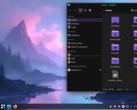A recent test by YouTuber ETA PRIME highlights how the Lenovo Legion Go S (currently $729 on Amazon) benefits significantly from Lossless Scaling, a third-party frame generation tool that boosts FPS in games lacking native support. The video showcases the SteamOS-powered handheld running games like Elden Ring and Oblivion Remastered at much higher frame rates.
The Legion Go S tested in the video features an 8-inch IPS display with a 120 Hz variable refresh rate, paired with 32 GB of RAM and an 8-core, 16-thread Ryzen Z1 Extreme processor. This SteamOS variant differs from the Windows-powered version with the Ryzen Z2 Go APU that we reviewed earlier, though much of the hardware design carries over.
Back then, we highlighted the comfortable grip surfaces, stable build quality, and the premium feel of the large 8-inch panel, elements that continue to set the Legion Go S apart. If you’d like a closer look at the design and ergonomics, you can dive into our full review of the Windows model or catch the video too.
In performance testing, ETA PRIME noted that Elden Ring at 900p high settings managed around 40–50 FPS at 18 W TDP. However, after enabling Lossless Scaling, the frame rate improved, averaging between 70 and 80 FPS.
Meanwhile, Oblivion Remastered, without any frame generation, initially delivered an average of 40 FPS at 900p medium settings. With FSR turned on, the frame rate jumped to 60 FPS but suffered from occasional dips to 55 FPS or below. When ETA PRIME enabled Lossless Scaling at 2x, the game ran smoothly, hovering around 70 FPS and even reaching 80 FPS in some areas.
The main idea with Lossless Scaling remains simple: it aims to improve performance at lower wattage, thus extending the battery life of handhelds and making them much more capable machines while people are on the move.
ETA PRIME goes into more depth on how Lossless Scaling works on the SteamOS-powered Lenovo Legion Go S, so remember to watch the full video below. In it, they also test Lossless Scaling in Cyberpunk 2077, encountering some ghosting issues, but you’ll understand it better by taking a look yourself.










































